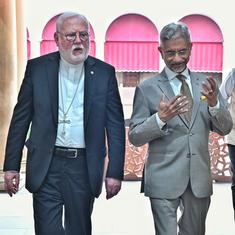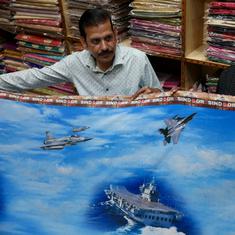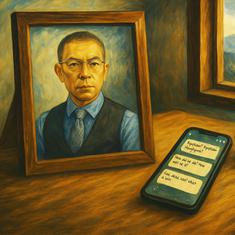For long, the pleasing image of Sachin Tendulkar standing up on his toes to punch a Shane Warne delivery through the back foot remained one of the grandest spectacles that graced the world of cricket in the last two decades. Be it Rahul Dravid’s awe-inspiring solid defence as he stood tall on a challenging first day of a Test match or MS Dhoni’s iconic six which clinched the World Cup for India in 2011 after a gap of 28 long years, cricket has remained a game which has provided memorable scenes over the years.
Behind the scenes, it is the onus of the commentators to bring alive these unforgettable moments to a captive television watching audience. By giving their voice to the wonderful sights of the game, they provide knowledgeable details and experienced information which only alleviates an average fan’s love affair with cricket.
Sans Ravi Shastri’s hysterical appraisal of every Virat Kohli cover drive, Danny Morrison’s over enthusiasm after every AB De Villiers blitzkrieg or Wasim Akram’s insightful remarks on Jasprit Bumrah’s repertoire of yorkers, it is fair to say that cricket would have just remained a monotonous affair between bat and ball.
Following the footsteps of the much acclaimed Richie Benaud, Tony Grieg, David Hookes and Tony Cozier can prove to be a disastrous affair, but the likes of David Lloyd and Harsha Bhogle have managed to emphatically carve a niche for themselves in this field, so much so that they can unanimously be termed as the best commentators in world cricket today.
David Lloyd (England)
Having donned the roles of a Test and One-Day International opener for England, David Lloyd turned to first-class cricket umpiring for a period of two years, after which England cricket signed him up as the national coach for the 1999 World Cup. He then settled for the more comfortable role of a television commentator, winning over the public with his chirpy catchphrases and his verbal quality. “Start the car”, “start the tuk-tuk”, “flippin’ murdered them” and “time for a Root” remain some of his trademark exclamations that have enthralled people the world over.
Having started his innings with Test Match Special, a British radio programme that dealt exclusively with Test matches, Lloyd shifted to the acclaimed Sky Sports, with whom he broadcasts currently. A regular in almost all of England’s matches, “Bumble” – as Lloyd is lovingly called after bearing resemblance to a character in a children’s series “The Bumblies” – has found much appreciation due to his minute observations, which are delivered in a typical English accent. Amidst other Sky commentators Nasser Hussain, Ian Botham and Michael Atherton, Lloyd has managed to emerge as an all time favourite, courtesy his perfect diction and balanced opinions.
Never short of colour, Lloyd’s humorous anecdotes never fail to diffuse the tension in an Ashes encounter. Having had the experience of being a player, umpire and a coach, Lloyd is one of the unique broadcasters who can provide first-hand information about the psyche and functioning of all those involved in a cricket game.
His gesture to allow Ian Bishop to control the reigns of the commentary box in the last stages during the 2016 World Twenty20 final, between West Indies and England this year, goes on to explain his selflessness. Aware of the implications that a possible World Cup triumph had on a West Indian, who had witnessed lowly depths in cricket in recent years, Bumble urged Bishop to soak in the historical moment as Carlos Braithwaite sent the ball in the air for the fourth time in succession, thereby helping West Indies clinch the World Cup.
Harsha Bhogle (India)
The national outpouring of anger towards the Board of Control for Cricket in India in March this year, after it sacked Harsha Bhogle from its commentary panel, only gives a slight indication of the admiration that the general cricket watching audience has for this cricket expert. Always well versed and well prepared with the history as well as present day cricket, Bhogle made a mark for himself despite not having played professional cricket for the state or the country.
Having started his journey with All India Radio, Bhogle rose up the ranks with his witty one-liners and a tongue-in-cheek way with words that even saw him being voted as the best television cricket commentator in a worldwide poll run by ESPNCricinfo. Bhogle rose to reign supreme behind the microphone and excel in a sport which he proclaimed, became the reason for his existence.
Possessing an enviable mastery over the language and a humour which found no other competition, Bhogle brings alive every cricketing stroke and well earned wicket with articulate compliments, unlike his almost too excited contemporaries.
His solid charisma and childlike passion for the game spills onto television sets every time he is on air. Praising Tendulkar’s drive with a classy “Open the textbook, turn to page 32” or an truthfully honest remark when he quipped, “Dhoni is quick between the wickets and Ashwin… let’s just say he has other skills”, Bhogle effortlessly strikes gold!
Geoffrey Boycott (England)
Aged 76, Geoffrey Boycott still remains as passionate and overzealous for cricket as he was almost 50 years ago when he made his Test debut for England against Australia. Having scored over 8,000 runs at an average of 48, Boycott went on to become one of England’s most successful Test openers of all time.
After retiring from the game, Boycott turned to the microphone to offer his invaluable and often outspoken expertise and inputs and is currently a member of the Test Match Special commentary team, which airs on BBC Radio 4.
What sets Boycott apart from the crowd of commentators that hound the field is his superlative experience and a powerful control over the English diction. Always animated and well informed with logical opinions, Boycott’s stock phrases “corridor of uncertainty” and “hit the ball with a stick of rhubarb”; along with his constant narrations of tales involving his “mam” and “grandmam” have made him a priceless voice in the commentary box.
A battle with throat cancer never came in the way of pursuing his stint further, and his return was marked with greater fervour. He believes in analysing every moment and every thought before unleashing his views upon the audience. Blessed with a deep understanding of the game, Boycott believes in forensically dissecting the game and sees what is going to happen before events actually happen.
Always a firm believer in sharing stories on the field, Boycott has remained away from unnecessary statistics. He argues that he can never be called a fan of the game as it makes one biased but rather focuses on presenting the honest and fair truth behind every decision. Although he has been in the news for attacking Ricky Ponting and for using ribald language on air, his partnership with Tony Greig remained a highlight for all cricket lovers in the 1990s.
Fazeer Mohammed (West Indies)
A slightly unknown entity, Fazeer Mohammed has been termed as the voice of West Indian cricket after the death of Tony Cozier, with whom he has shared many a memorable partnership, both on radio and on television. Fazeer is known to never mince words, presenting his views very objectively, even if it entails getting embroiled in controversies.
He has extensively voiced his thoughts on the road ahead for West Indian cricket and remains firm in his belief that the greatness of a sporting legend transcends the figurative statistics.
Having started his career in 1987 sans a professional career in cricket, Fazeer has had it tougher than most cricketer-turned-commentators when it comes to presenting his views on a live broadcast, but he has emerged as a serious expert, devoid of the hullabaloo that most of his colleagues indulge in.
Mark Nicholas (England)
The first English player to head the reputed Channel Nine in Australia, and also being seen as a possible replacement of Richie Benaud, remains Mark Nicholas’ greatest feat in his stint as a commentator. The fact that he was offered this role despite never having played international cricket, when his Aussie counterparts were well established former captains, further adds to his achievement, highlighting why he deserves a place in this list.
Nicholas remains one of the most underrated commentators in this era, neither overanalysing, nor going overboard with excitement on occasions. In the memorable summer of 2005, when England won the coveted Ashes, Nicholas overthrew legends like Benaud, Boycott, Tony Greig and Michael Slater to be voted as the voice of 2005.
Equipped with the art of hyperbole and perfect, crisp statements like “That is very good” to describe an unplayable reverse swinging delivery. Nicholas’ aura lies in his ability to ameliorate the cricket loving public’s joy of witnessing a game, rather than just telling people what they are seeing.
He blends humility with an objective knowledge of the game, and his boyish excitement for the game is a sole reason why he has been signed on to present the Test matches in the Australian summer this season.
Michael Holding (West Indies)
“Whispering Death”, Michael Holding was called, when he mowed down the opposition with his fiery pace and he remains as impeccable off it as well. A member of the Sky Sports commentary team for almost a decade and a half, Holding’s opinions and knowledge, delivered with a heavily accentuated Jamaican twang have made him a sought after broadcaster as well.
Sticking to his beliefs, even if it impacted his commentary stint, Holding remains a force to reckon with even without the cherry in his hand. He has refused to participate in the carnival of Twenty20 cricket, even though it would offer him a few ready dollars. In 2001, he refused to broadcast for South Africa’s tour to West Indies as he disagreed with the appointment of Carl Hooper as his national team’s captain.
Along with Ian Bishop, Holding prides himself in belonging to the now lost generation of menacing fast bowlers that West Indies possessed, but off the field, he continues to weave his magic.
The honourable mentions
Ian Chappell, Mark Taylor, Mike Haysman and Simon Doull all have the aptitude and the knack for providing excellent and well rehearsed details of the on field action but somewhere lack the capacity to hold on to an audience’s attention for long intervals and thus sadly miss the cut.









